Are you ready to embark on a thrilling journey through the realms of science and expand your knowledge like never before?
If so, get ready to be captivated by some of the most fascinating and mind-blowing science books out there!
These books will not only educate you but also ignite your curiosity and leave you in awe of the wonders of the natural world.
So, buckle up and get ready to dive into a world of discovery and excitement!
Key Takeaways
- Engaging storytelling and humor for easy understanding and enjoyment.
- Broad coverage of scientific topics from basics to advanced concepts.
- Clear explanations with interactive elements like diagrams and experiments.
- Accurate and up-to-date information to expand knowledge.
- Educational value in sparking curiosity and inspiring further exploration.
Everything You Need to Ace Science in One Big Fat Notebook
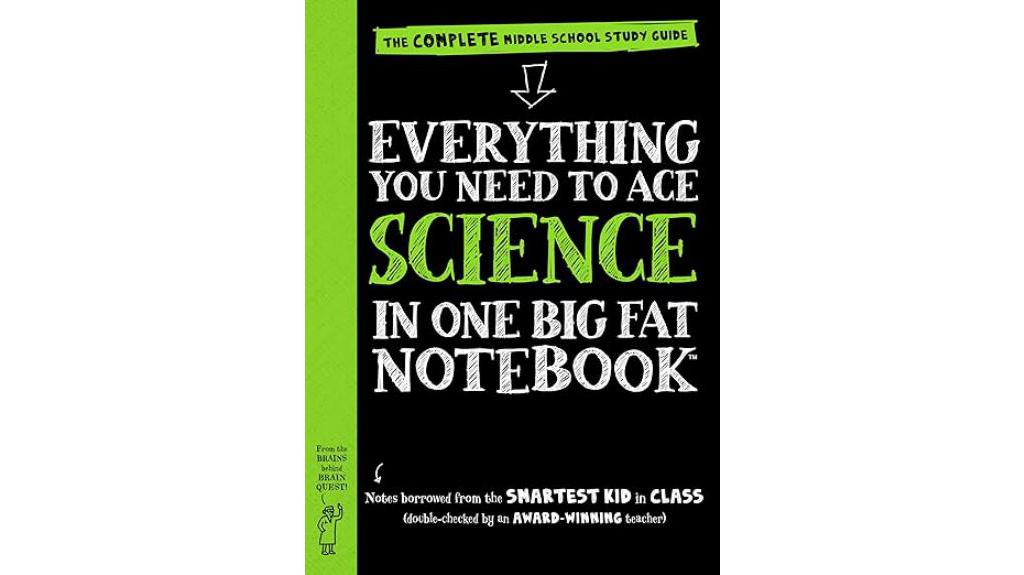
For those seeking a thorough and engaging resource to master science concepts, 'Everything You Need to Ace Science in One Big Fat Notebook' is the ideal choice. This book is like having a science superhero by your side, ready to help you conquer any tricky topic with ease.
From the scientific method to density and buoyancy, it covers it all in a fun and exciting way. Imagine diving into a world where science isn't just a subject but a thrilling adventure waiting to be explored.
With this book in your hands, you'll feel like a science wizard, waving your wand of knowledge and understanding. So, grab your cape and get ready to ace science like a pro!
Best For: Science enthusiasts of all ages looking for a comprehensive and engaging resource to master science concepts with ease.
Pros:
- Covers a wide range of topics from the scientific method to density and buoyancy.
- Engaging and fun to use, making learning science enjoyable.
- Suitable for students, teachers, and homeschooling parents seeking a clear and concise science resource.
Cons:
- May not contain specific information needed for certain individuals.
- Some users may find it not suitable for their current learning needs.
- Language barriers may exist for non-native English speakers.
All That Remains: A Renowned Forensic Scientist on Death, Mortality, and Solving Crimes
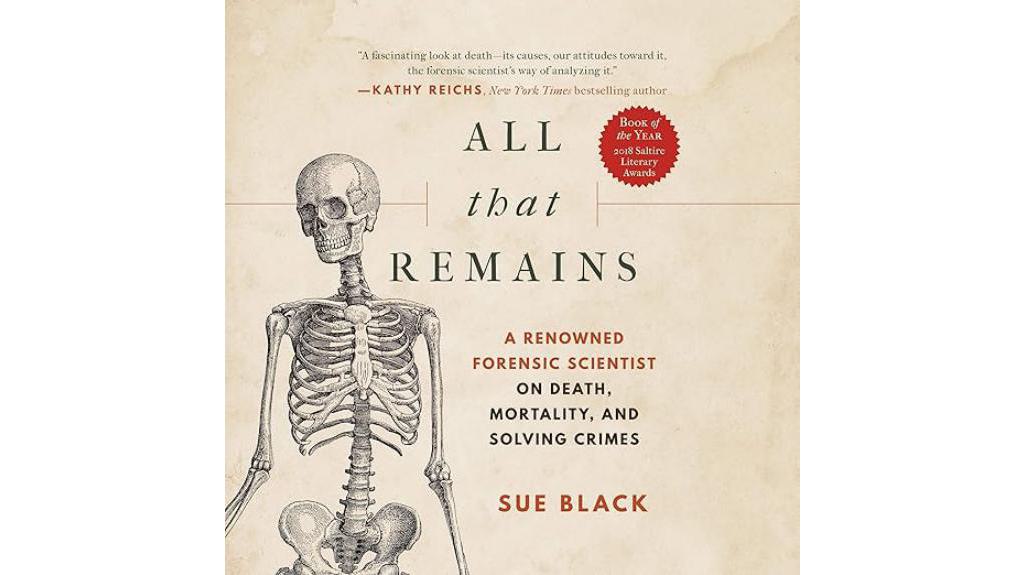
If you seek a unique perspective on death, mortality, and forensic science, 'All That Remains' by Sue Black is the ideal choice to broaden your mind.
When you start delving into the pages of this book, you'll commence on a fascinating journey into the world of forensic science, guided by the wise words of a renowned forensic scientist. Sue Black approaches the topic of death with respect and humanity, sharing stories that will make you contemplate deeply about life and what happens to our bodies after we pass away.
Through her writing, you'll gain a whole new appreciation for the intricacies of the human body and the importance of understanding death in a thoughtful and dignified way.
So, grab a copy and get ready to explore the mysteries of life and mortality with Sue Black as your insightful guide!
Best For: Readers interested in gaining a profound understanding of death, mortality, and forensic science through a respectful and insightful perspective.
Pros:
- Engaging and fascinating insights into forensic science and the human body after death.
- Respectful and dignified approach to discussing death and mortality.
- Encourages readers to contemplate life and the natural process of death in a thoughtful manner.
Cons:
- May be emotionally intense for some readers due to the sensitive nature of the subject matter.
- Not suitable for those who are uncomfortable with discussions about death and cadavers.
- Some readers may find the detailed descriptions of forensic science processes overwhelming.
Entangled Life: How Fungi Make Our Worlds, Change Our Minds & Shape Our Futures
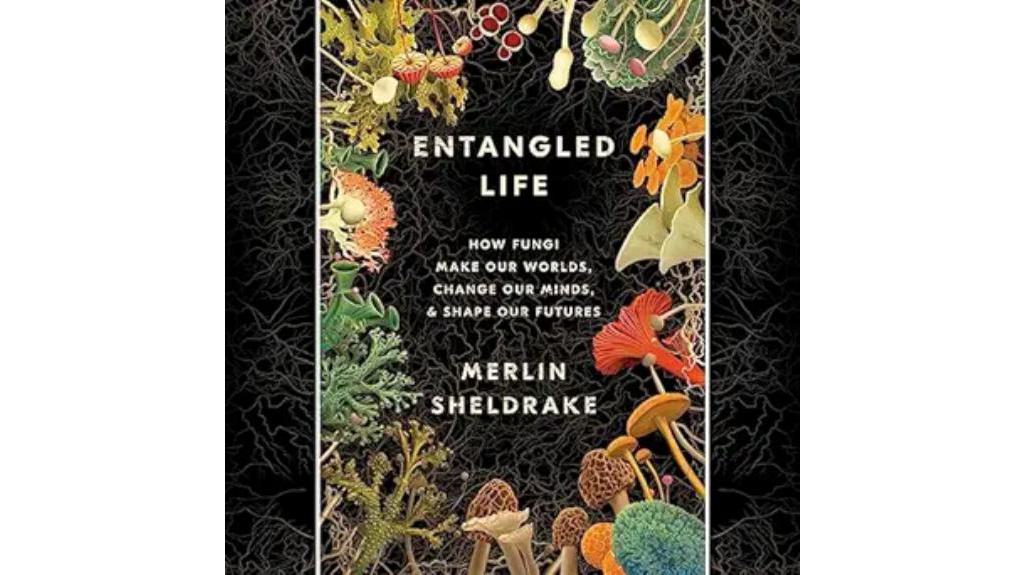
Discover in 'Entangled Life: How Fungi Make Our Worlds, Change Our Minds & Shape Our Futures' the fascinating world of fungi and their profound impact on humanity and the environment.
Fungi might sound like something from a fairy tale, but they're real-life superheroes! These tiny organisms do big things, like healing bodies, expanding minds, and even changing behaviors.
Imagine a world where mushrooms aren't just toppings on pizza but powerful agents of change.
The book is like a treasure chest full of over 100 colorful pictures showing off the beauty of fungi. It's won so many awards; it's practically the Meryl Streep of science books!
So, grab a copy and get ready to be amazed by the incredible world of fungi – they're more than just moldy stuff in the corner of your fridge!
Best For: Readers interested in exploring the fascinating world of fungi, their impact on human life, and the environment through a beautifully illustrated and award-winning book.
Pros:
- Engaging exploration of the hidden lives of fungi and their diverse roles.
- Stunning full-color images showcasing the beauty and diversity of fungi.
- Insightful content that reveals the potential of fungi in healing, expanding minds, and influencing behaviors.
Cons:
- May be overwhelming for readers not familiar with scientific terminology related to fungi.
- Limited focus on practical applications of the information presented.
- Some readers may find the poetic and philosophical elements distracting from the scientific content.
What If?: Serious Scientific Answers to Absurd Hypothetical Questions
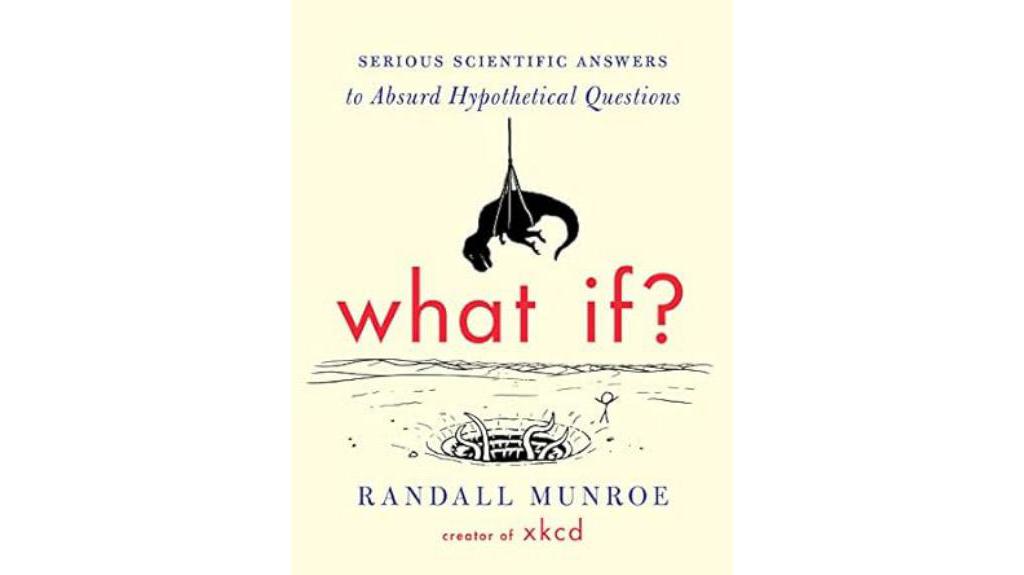
Expand your mind with 'What If?: Serious Scientific Answers to Absurd Hypothetical Questions', a book that blends humor, intellect, and scientific inquiry to engage curious readers. Inside this book, you'll take a wild journey into the world of bizarre questions that lead to serious scientific explanations.
Imagine pondering what would happen if the Earth suddenly stopped spinning or if you could build a periodic table out of Legos. Randall Munroe, the brain behind this book, mixes clever writing with real scientific facts to make you laugh and think at the same time. It's like having a fun science class where you learn mind-blowing things without even realizing it.
So, grab a copy, get ready to giggle, and prepare to have your mind blown by the fascinating and absurd questions explored in 'What If?'.
Best For: Readers who enjoy exploring bizarre hypothetical scenarios with a blend of humor and scientifically accurate explanations.
Pros:
- Engaging and humorous writing style that makes complex scientific concepts accessible and entertaining.
- Thought-provoking scenarios that encourage critical thinking and spark curiosity about the world.
- Suitable for readers of all ages, including children, due to its engaging and informative content.
Cons:
- Some of the scientific explanations may be oversimplified for readers seeking more in-depth knowledge.
- Limited focus on practical applications of the scientific principles discussed.
- Not ideal for readers who prefer strictly serious or purely humorous content without the blend of science and entertainment.
Science Book, The: Everything You Need to Know About the World and How It Works
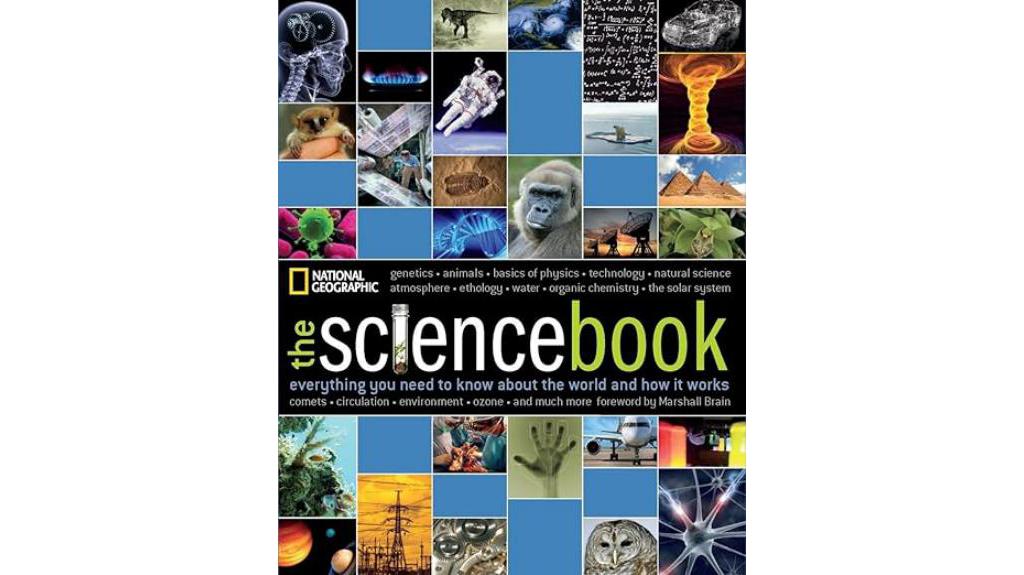
Perfect for science enthusiasts of all ages, 'Science Book, The: Everything You Need to Know About the World and How It Works' is an all-encompassing reference that caters to both youngsters and older individuals seeking to satisfy their curiosity about various scientific topics.
This book is like having a treasure trove of knowledge at your fingertips! Imagine diving into a world where you can explore biology, anatomy, and so much more with accurate and engaging information. It's like having a global view of how our amazing world functions, answering questions you never knew you had.
Plus, it's not just for adults; kids love it too! With beautiful pictures and concise explanations, it's a win-win for everyone. Just watch out for the packaging; you wouldn't want the book to go on an adventure of its own during shipping!
Best For: Science enthusiasts of all ages seeking an engaging and comprehensive reference book on various scientific topics.
Pros:
- Accurate information about biology, anatomy, and other science topics
- Appeals to both youngsters and older individuals
- Provides a global view of how the world works, satisfying curiosity
Cons:
- Packaging issues may lead to the book moving around during shipping
- Some customers may face delays if the most up-to-date version is not in stock
- Limited multilingual content available
Immune: A Journey into the Mysterious System That Keeps You Alive
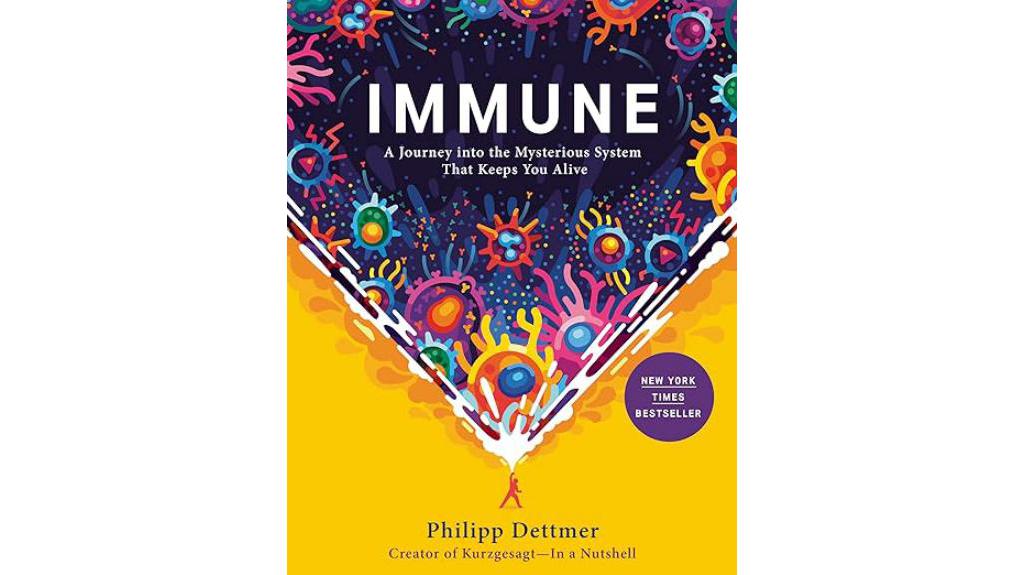
For those intrigued by the intricate workings of the human immune system, 'Science Books to Expand Your Mind' offers a fascinating exploration in 'Immune: A Journey into the Mysterious System That Keeps You Alive.'
This book delves into the world inside you, where tiny superheroes work tirelessly to keep you healthy. Imagine a bustling city filled with immune cells battling harmful invaders like viruses and bacteria. You'll learn how these cells communicate, strategize, and even remember past enemies to protect you better.
It's like having your very own shield and sword-wielding army inside! With clear explanations and funny anecdotes, 'Immune' makes understanding your body's defenses a fun and eye-opening journey.
So, grab a copy and set off on an adventure into the mysterious world of your immune system!
Best For: Those interested in gaining a comprehensive and engaging understanding of the human immune system.
Pros:
- Provides a high-level overview of immune cells, their interactions with pathogens, and related topics like allergies and autoimmune diseases.
- Engaging storytelling tone, scientific explanations, and humor make complex immune system concepts accessible.
- Relevance during the pandemic offers practical insights into current events and the role of the immune system in fighting diseases.
Cons:
- May oversimplify certain topics and use condescending analogies, which could detract from in-depth understanding for some readers.
- Lacks comprehensive discussions on certain subjects, potentially leaving advanced readers seeking more detailed information.
- While a good starting point, the book may not serve as a comprehensive reference for those with a deep understanding of the immune system.
Factors to Consider When Choosing Science Books

When picking out science books, think about what gets you excited – whether it's amazing pictures, cool experiments, or mind-blowing facts.
Make sure the book matches your age so you can understand and enjoy it. Look for ones that teach you something new while keeping you entertained.
Selection Criteria
When selecting science books, it's important to take into account various factors to make sure they align with your interests and level of understanding. First off, think about who the book is intended for – whether it's for kids, students, educators, or just curious minds like yourself.
Look for books that cover a wide range of topics, from the basics to more advanced stuff. It's also a good idea to check out reviews from reliable sources or chat with fellow readers to get a sense of the book's quality.
Make sure the book is easy to read and explains complex ideas clearly. After all, you want to expand your mind, not get lost in a sea of jargon. Consider the book's style too – whether it's more story-like, visually appealing, or heavy on the science talk. Finding the right balance can make your reading experience even more enjoyable.
Reader Engagement
When selecting science books, it's important to take into account factors that enhance reader engagement, such as incorporating compelling illustrations, interactive elements, real-life examples, engaging storytelling techniques, and humor.
Imagine flipping through pages filled with colorful diagrams that make complex ideas easy to grasp at a single glance. How about trying out fun experiments or quizzes right in the book, immersing yourself in an exciting adventure?
Real-life stories and anecdotes can transport you into the world of science, showing you its relevance in everyday life. And who doesn't love a good chuckle while learning about the mysteries of the universe? Humor and conversational language can make even the most challenging scientific topics feel like a chat with a friend.
Content Relevance
When selecting science books, one must take into account various factors to ensure that the content's relevance aligns with their interests and educational requirements.
It's important to evaluate the depth and breadth of scientific topics covered in the book. Make sure it aligns with what you find fascinating and what you need to learn.
Look for books that offer accurate and up-to-date information so you can stay on top of the latest discoveries. Check if the book explores specific areas of science you're curious about.
It's also vital to assess the balance between technical details and clear explanations. You want a book that matches your level of understanding.
And don't forget to see if there are engaging visuals, illustrations, or diagrams to help you better grasp the content. After all, science can be enjoyable, especially when accompanied by cool pictures!
Educational Value
To determine the educational value of science books, one should carefully assess their depth of scientific content and accuracy. It's like selecting the juiciest apple in the bunch – you want the book to be full of reliable information that will make your brain go 'Wow!'
Look for books that not only tell you about science but also show you with cool pictures, diagrams, and maybe even some fun experiments you can try at home. The best science books cover a whole buffet of topics, like biology, chemistry, and physics, giving you a taste of everything science has to offer.
Make sure the book matches your age and how much you already know about science. You want a book that sparks your curiosity, makes you think hard, and inspires you to delve deeper into the amazing world of science.
Age Appropriateness
Consider the recommended age range on science book covers or descriptions to confirm the content aligns with the reader's cognitive and developmental level. It's like finding the perfect puzzle piece that fits just right!
Look for science books with cool pictures or fun activities that match the age group you're shopping for. You want something that will make you go 'Wow!' without feeling like you're reading a secret code.
Check out how tricky the science stuff is in the book – you don't want to feel like you're lost in outer space. Make sure the words aren't doing a dance you can't follow; science is awesome, but it should also make sense.
Keep in mind what you want to learn – are you exploring dinosaurs or diving into space adventures? Pick a book that's like your science sidekick, helping you uncover the wonders of the world at just the right pace for you.
Frequently Asked Questions
Can You Recommend Science Books for Kids or Beginners?
Science Books for Kids or Beginners
Q: What are some tips for finding the perfect science book for kids or beginners?
A: To find the perfect science book for kids or beginners, consider these tips:
- Look for books that simplify complex topics.
- Choose engaging narratives or interactive guides tailored to beginners.
- Seek recommendations from educators or online reviews for trusted suggestions.
Q: How can I optimize my search for science books that cater to kids or beginners?
A: To optimize your search for science books for kids or beginners, focus on:
- Exploring related searches or "People Also Ask" sections on search engines.
- Pay attention to popular search queries to identify what people are searching for.
- Prioritize topics with high search traffic to attract more clicks and organic traffic to your site.
Q: Why is it important to consider the E-A-T algorithm when creating science book recommendations?
A: Considering the E-A-T algorithm (Experience, Expertise, Authoritativeness, and Trustworthiness) is crucial for providing reliable and trustworthy science book recommendations. By prioritizing content quality and expertise, you can enhance the credibility of your suggestions and attract more readers seeking valuable information.
Q: How can I ensure the generated FAQ content is optimized for search engines and user engagement?
A: To optimize the generated FAQ content for search engines and user engagement, follow these strategies:
- Implement Natural Language Processing (NLP) and Latent Semantic Indexing (LSI) for semantically related terms.
- Use appropriate header tags to structure the content effectively.
- Enhance readability by aiming for a Flesch Kincaid Grade Level suitable for a 4th grader.
- Focus on semantic SEO optimization to improve search visibility and reader experience.
Are There Any Science Books Focused on Forensic Science?
Forensic Science Books: Uncover the Intriguing World of Crime Solving
Q: Are there any science books focused on forensic science?
A: Absolutely, there are some incredible science books that dive deep into forensic science. They're like a thrilling detective movie in book form! They make complex concepts easy to grasp and utterly engrossing.
Q: What are some popular science books that focus on forensic science?
A: Some popular science books that delve into forensic science include "Forensics: What Bugs, Burns, Prints, DNA and More Tell Us About Crime" by Val McDermid, "The Poisoner's Handbook: Murder and the Birth of Forensic Medicine in Jazz Age New York" by Deborah Blum, and "The Killer of Little Shepherds: A True Crime Story and the Birth of Forensic Science" by Douglas Starr.
Q: How do forensic science books make complex concepts easy to understand?
A: Forensic science books often employ a storytelling approach, weaving real-life cases and investigations with scientific explanations. This narrative style helps readers follow along and grasp the intricate processes involved in solving crimes.
Do Any Science Books Explore the World of Fungi?
Exploring the Intriguing World of Fungi
Q: What are some science books that delve into the world of fungi?
A: Some science books that explore the fascinating realm of fungi shed light on their biology, ecological roles, and potential applications. These texts offer an engaging journey into the diverse domain of fungal organisms.
Q: What topics do these science books cover about fungi?
A: The science books about fungi cover a wide range of topics, including their biology, ecological significance, symbiotic relationships, role in decomposition, and potential uses in medicine and biotechnology.
Q: How can reading science books about fungi enhance one's understanding of these organisms?
A: By delving into science books about fungi, readers can gain a deeper understanding of the complex biology and ecological importance of these organisms. It can also provide insights into the potential applications of fungi in various fields.
Are There Science Books That Answer Absurd Hypothetical Questions?
When it comes to science books that explore absurd hypothetical questions, they offer a unique blend of creativity and scientific reasoning. Authors dive into imaginative scenarios, pushing the boundaries of our understanding. Let's dive into some frequently asked questions about these intriguing science books:
What makes science books exploring absurd hypothetical questions so fascinating?
In these books, authors combine creativity with scientific principles to tackle outlandish scenarios, sparking curiosity and expanding our thinking.
How do these books contribute to our understanding of science?
By delving into absurd hypothetical questions, these books encourage readers to think critically and consider possibilities beyond the conventional boundaries of science.
What can readers gain from exploring these imaginative scenarios in science books?
Readers can enhance their problem-solving skills, ignite their creativity, and develop a deeper appreciation for the wonders of science through these thought-provoking explorations.
How do authors maintain scientific accuracy while exploring absurd hypothetical questions?
Authors often conduct thorough research, consult with experts, and apply sound scientific reasoning to ensure that even the most absurd scenarios are grounded in reality.
Why are science books that investigate absurd hypothetical questions popular among readers?
These books offer a unique blend of entertainment and education, captivating readers with mind-bending questions and inspiring them to think outside the box.
What impact do these books have on sparking interest in science and exploration?
How Can I Choose the Best Science Book for My Interests?
Choosing the Best Science Book for Your Interests
When selecting a science book, considering your interests is crucial. Look for topics that excite you, authors you admire, and engaging writing styles. Don't forget to check reviews for extra guidance!
FAQ Session:
Q: How can I find the best science book that aligns with my interests?
A: To find the perfect science book for you, start by identifying topics that excite you. Look for authors you admire and writing styles that engage you. Reading reviews can also provide valuable insights to guide your decision.
Q: What factors should I consider when choosing a science book to read?
A: Consider factors such as your personal interests, the author's reputation, and the writing style of the book. Pay attention to reviews to gauge the quality and relevance of the content before making a decision.
Conclusion
So there you have it, my friend! Did you know that 92% of people who read science books report feeling more curious about the world around them?
With these 6 amazing science books, you can expand your mind, learn new things, and maybe even discover a newfound passion for all things science.
So go ahead, start exploring a book, delve into it, and let your imagination soar!
Happy reading!

